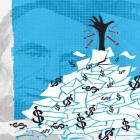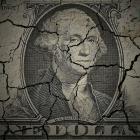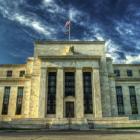The year 2020 has caused many white people to realize we live in a racist system. The Green New Deal is about systemic change for all, and deconstructing racism must be front and central in this agenda.
Federal Reserve Act
Follow:
-
Saving Illinois: Getting More Bang for the State’s Bucks
Illinois is teetering on bankruptcy and other states aren't far behind, largely due to unfunded pension liabilities. But the state could turn its sizable pension fund into a self-sustaining public bank.
-
100 Years Is Enough: It's Time to Make the Fed a Public Utility
Today marks the 100th anniversary of the Federal Reserve, warranting a review of its performance. Has it achieved the purposes for which it was designed?
-
100 Years of the Federal Reserve
“The United States Federal Reserve announced Wednesday that it will start drawing down (i.e. “tapering”) its multibillion-dollar quantitative easing policies in 2014. The Fed will begin tapering its $85 billion monthly purchases of Treasuries and Treasury mortgage-backed securities by $5 billion each starting in January.”
-
Illuminate the Fed on Its Centennial – Because One Century Is Enough
The Federal Reserve Act, signed into law 100 years ago on December 23, 1913, was written in private, “debated” when Congress was empty, and voted on after most had gone home for Christmas. When better to stage an economic coup on the nation?
-
If You're #FedUp, Stand Up: A Movement Grows to Nationalize the Federal Reserve
On December 23, the 100th anniversary of the Federal Reserve, the #D23 Fed Up campaign is counting on people in every city where the Fed has a presence to demand that power over our economy return to the people. It's time to Illuminate the Fed.
-
Amend the Fed: We Need a Central Bank that Serves Main Street
December 23 marks the 100th anniversary of the Federal Reserve, prompting growing calls to audit or end the Fed. At the least Congress needs to amend it — modifying the Federal Reserve Act to allow the central bank to carry out its mandates.
-
Collateral Damage: QE3 and the Shadow Banking System
Rather than expanding the money supply, quantitative easing has actually caused it to shrink by sucking up the collateral needed by the shadow banking system to create credit.
-
The Financial Instrument That Could Save the Economy - and Why It Hasn't
Quantitative easing doesn't actually increase the circulating money supply, it merely cleans up the toxic balance sheets of banks.












